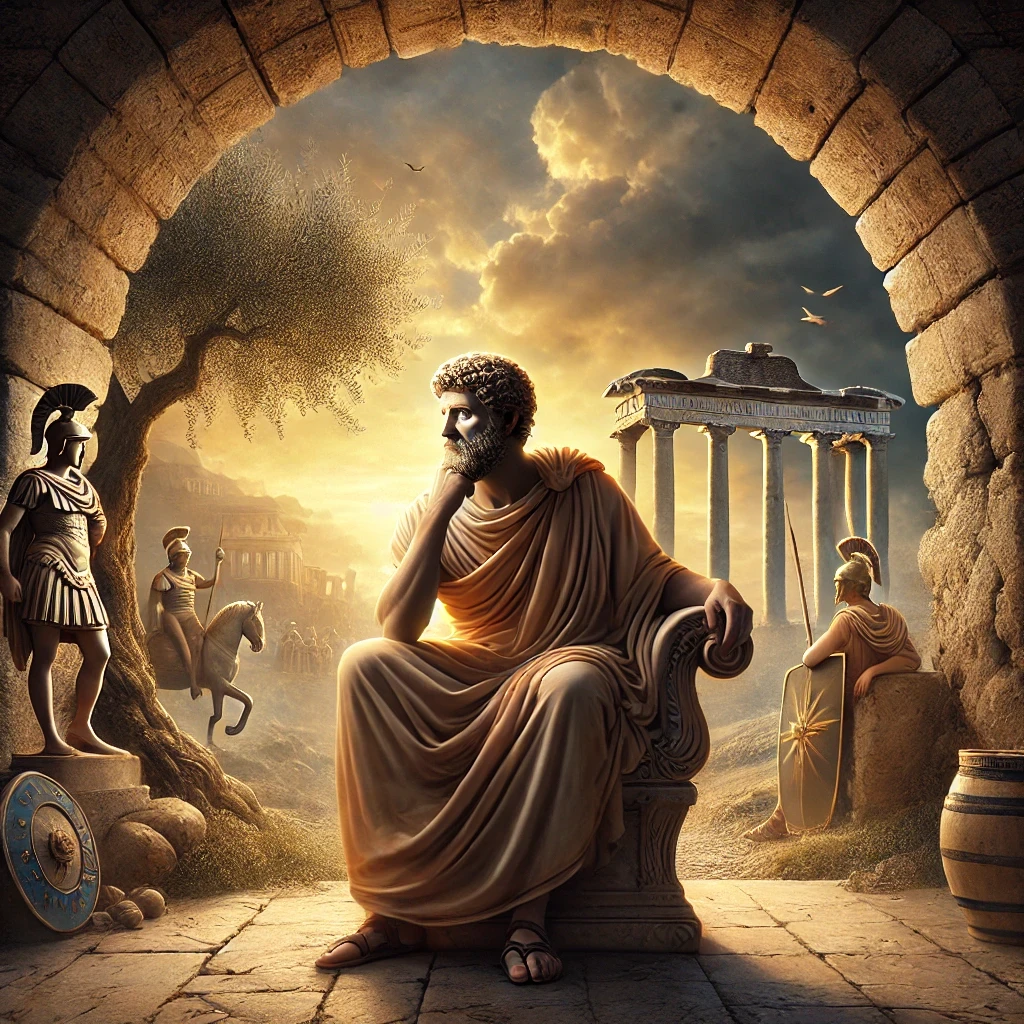Marcus Aurelius: Timeless Wisdom for a Chaotic World
Discover the timeless wisdom of Marcus Aurelius. Learn how the Stoic philosopher-king's teachings on resilience, leadership, and inner peace can help you navigate modern life's challenges.

Jon High
·
Nov 28, 2024
Who was Marcus Aurelius, really? Ask most people, and they’ll mention his role as a Roman Emperor. Maybe they’ll toss in the phrase "philosopher-king" if they’re feeling extra scholarly. But let’s be honest: most don’t really know him beyond his cameo in Gladiator. And honestly, that’s a tragedy.
Because Marcus Aurelius wasn’t just a ruler; he was a man wrestling with what it means to live a good life, even when everything around him seemed to be falling apart. His life and writings in Meditations are a masterclass in how to thrive, even when the world feels out of control.
So, let’s dig into who he was, what he stood for, and how his teachings can help us today.
1. The Reluctant Emperor: Why Power Wasn’t His Goal
When Marcus Aurelius took the throne in 161 CE, it wasn’t because he wanted to. In fact, he reportedly never sought power. To him, ruling wasn’t a privilege—it was a duty. He often reflected on how fleeting and corrupting power could be. “Just that you do the right thing,” he wrote. “The rest doesn’t matter.”
For Marcus, being emperor was an obligation to serve others. And it’s this humility that sets him apart. In a time when leaders built statues to glorify themselves, Marcus instead left behind Meditations, a deeply personal journal that shows us the heart of a man striving to live virtuously.
A Lesson for Us Today
Marcus Aurelius reminds us that power or success alone won’t bring fulfillment. Think about your own life: How often do we chase things—a bigger house, a promotion, more followers on social media—only to find they don’t really satisfy us? His life reminds us to keep our focus on something deeper: integrity, service, and doing what’s right, even when it’s hard.
For more on how Stoicism addresses modern ambitions and stress, check out “Your Problems Aren’t Special”.
2. Meditations: Philosophy for the Rest of Us
Let’s pause for a second and appreciate this: Marcus Aurelius, one of the most powerful men in history, took time to journal his thoughts not for the world, but for himself. He wrote Meditations as a way to remind himself of the principles he wanted to live by. But in doing so, he left us one of the most profound guides to life ever created.
Key Lessons from Meditations
Some of the most powerful takeaways include:
Focus on what you can control. One of Marcus’s core beliefs was that external events don’t define us; our reactions to them do. As he famously wrote, “You have power over your mind—not outside events. Realize this, and you will find strength.”
→ Next time you’re stuck in traffic or waiting for a late train, remember: the delay isn’t ruining your day. Your frustration is. Shift your mindset, and you reclaim your peace.
Life is fleeting. Marcus constantly reminded himself of life’s brevity. “You could leave life right now. Let that determine what you do and say and think.” This isn’t meant to be depressing—it’s freeing. Knowing we have limited time pushes us to focus on what truly matters.
Happiness starts within. “The happiness of your life depends upon the quality of your thoughts.” In a world where we’re bombarded by distractions, Marcus’s words feel like a much-needed wake-up call.
For a deeper dive into Meditations itself, check out “Meditations by Marcus Aurelius: Book Summary, Key Lessons, and Best Quotes”.
3. Stoicism: The Ultimate Anti-Anxiety Toolkit
If you’ve ever scrolled Instagram, chances are you’ve seen quotes from Marcus Aurelius pop up, often captioned as “stoic wisdom.” But what is Stoicism, really? At its core, it’s a philosophy that teaches us to focus on what we can control, accept what we cannot, and live according to reason and virtue.
For Marcus, Stoicism wasn’t just an intellectual exercise. It was a way of life. His philosophy helped him navigate the challenges of ruling an empire, raising a family, and facing his own mortality.
How to Apply Stoicism Today
Here are three ways Marcus’s Stoicism can help you:
Stop Blaming Others
We love to point fingers when things go wrong—at our coworkers, politicians, even the weather. But Marcus taught us that blame is wasted energy. Instead, focus on what you can change.→ Example: Your coworker dropped the ball on a project? Instead of stewing over it, think, What can I do to fix this?
Expect Obstacles
Life isn’t fair, and bad things will happen. Marcus knew this well. He often reminded himself to “welcome with affection” everything that fate throws at him. By expecting setbacks, we can respond with resilience rather than shock.→ Next time a plan falls apart, ask yourself: What can I learn from this? How can I adapt?
Practice Gratitude
Even amidst chaos, Marcus found reasons to be grateful. In one entry, he listed all the things he appreciated about his teachers, mentors, and loved ones.→ Make it a habit to reflect on what’s going right in your life, even during tough times.
For more practical exercises, see “40 Stoic Exercises for Daily Life: A Modern Guide to Ancient Wisdom”.
4. The Emperor in Crisis: Lessons in Leadership
Now let’s talk about Marcus’s time as emperor. It wasn’t smooth sailing. During his reign, Rome faced plagues, invasions, and economic hardship. Sound familiar? Yet through it all, Marcus remained calm, thoughtful, and dedicated to his people.
For insights on applying Stoicism to modern leadership, see “The Stoic Product Manager: Ancient Wisdom for Modern Tech”.
5. Marcus Aurelius and Modern Self-Help: Why He Still Matters
Why does Marcus Aurelius resonate so deeply today? Because his struggles were human struggles. He dealt with anxiety, frustration, and self-doubt—just like us. And his writings provide practical tools for handling those emotions.
Think about it: We live in a world that’s constantly telling us we need more—more success, more followers, more stuff. Marcus offers a refreshing counterpoint: You already have everything you need to live a good life. Focus on virtue, not vanity.
For more on how to integrate these ideas into your day-to-day life, read “Applying Stoicism to Modern Day Life”.
What Now?
In a world that often feels chaotic and overwhelming, Marcus Aurelius offers something rare: clarity. His philosophy reminds us to focus on what truly matters and let go of the rest. It’s not about achieving perfection; it’s about showing up every day and striving to live with integrity, courage, and grace.
So, the next time you’re feeling stuck, anxious, or unsure of your path, turn to Marcus Aurelius. Because, as he might remind us: The obstacle is the way.
